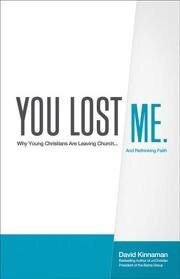David Kinnaman, You Lost Me: Why Young People are Leaving Church…and Rethinking Faith. Baker Books, 2011.
Companion volume: Kinnaman, unChristian
Referenced in: Generational Issues in Churches
LifeandLeadership.com Summary
This book from Barna Research reveals the results of a nationwide study of 18-29 year olds who have a Christian background but grow disenchanted with the church during emerging adulthood. Its purpose is to “define the dropout problem and interpret its urgency.” It is a companion to another Barna volume, unChristian, which showed how unbelievers from the same age group feel toward the church.
Kinnaman says that across America, “the ages eighteen to twenty-nine are the black hole of church attendance,” Why does this happen? Kinnaman warns against broad generalizations, and encourages us to listen to each story. In this light, he designates three groups of “dropouts” and their attitudes toward the church:
- Nomads: They walk away from church engagement but still consider themselves Christians.
- Prodigals: They lose their faith, describing themselves as “no longer Christian.”
- Exiles: They are still invested in their Christian faith but feel stuck (or lost) between culture and the church.
These are the three modes of disconnection. At the root of this disengagement is the church’s failure to challenge them and others toward serious discipleship, i.e. they simply do not see church’s as agents of genuine transformation and commitment. To the contrary, they believe the church is:
Overprotective — The church is “as a creativity killer where risk taking and being involved in culture are anathema.”
Shallow — The church conveys “easy platitudes, proof texting and formulaic slogans,” that fails to challenge them to deep commitment to use their passions, gifts and abilities to God’s glory.
Antiscience — Faith and science seem incompatible, as “science appears to welcome questions and skepticism, while matters of faith seem impenetrable.”
Repressive — ”Religious rules — particularly sexual mores — feel stifling to the individualist mindset of young adults. Consequently they perceive the church as repressive.”
Exclusive — The formative culture of this generation “esteems open-mindedness, tolerance, and acceptance,” which makes Christianity’s exclusive truth claims difficult to swallow.
Doubtless — The church does not allow them to express their doubts. They “feel that the church’s response to doubt is trivial and fact focused, as if people can be talked out of doubting.”
This resonates with the findings of Dean in Almost Christian and Smith in Soul-Searching, that our churches have passed on to the younger a faith defined as “moral therepeutic deism,” which fails to adequately challenge any age group with regard to discipleship.
Another contribution is the last section on Reconnections. Here he presents three proactive steps: “(1) the church needs to reconsider how we make disciples; (2) we need to rediscover Christian calling and vocation; and (3) we need to reprioritize wisdom over information as we seek to know God.” Also see the final chapter, “Fifty Ideas to Find a Generation,” with quotes from several notable authors on this subject, including Drew Dyck, Rachel Held Evans, and others.
Kinnaman is best as a basis for understanding why this group leaves the church and to get a broad picture of how to reclaim them. It is stronger on analysis than strategy, yet a very important tool to understanding the difficulties of reaching and keeping the younger generation.
From the Publisher
More than half of all Christian teens and twentysomethings leave active involvement in church.
David Kinnaman trains his researcher’s eye on these young believers and reveals the factors that contribute to the dropout problem. You Lost Me shows why Christians ages 18 to 29 are leaving the church and rethinking their commitment to the faith.
Based on new research conducted by the Barna Group, You Lost Me exposes ways the Christian community has failed to equip young adults to live “in but not of” the world—to follow Christ in the midst of profound cultural change. This wide-ranging study debunks persistent myths about young dropouts and examines the likely consequences for young adults and for the church if we maintain the status quo.
The faith journeys of the next generation are a challenge to the established church, but they can also be a source of hope for the community of faith. Kinnaman, with the help of contributors from across the Christian spectrum, offers ideas for pastors, youth leaders, parents, and educators to pass on a vibrant, lasting faith, and ideas for young adults to find themselves in wholehearted pursuit of Christ.
Includes ideas for passing on a flourishing, deep-rooted faith from:
Jon Acuff
Francis Chan
Shane Claiborne
Kenda Creasy Dean
Joshua DuBois
Donna Freitas
Steven Garber
Sara Groves
Gabe Lyons
Sean McDowell
Scot McKnight
Jedd Medefind
Britt Merrick
Walt Mueller
John Ortberg
Charlie Peacock
Kara Powell
Mark Regnerus
Richard Stearns
John Stonestreet
And many more
About the Author
David Kinnaman is the author of You Lost Me and president of The Barna Group, which provides research and resources that facilitate spiritual transformation in people’s lives. Since joining Barna in 1995, David has designed and analyzed nearly five hundred studies for a variety of churches, nonprofits, and corporations. He and George Barna write a free research report published online at www.barna.org. David and his wife, Jill, have three children and live in California.
***For additional information on this resource, including reviews,click the bookstore links. Check the reference at page top or the links below for resource guides on related topics.***
See Resource Guides on Over 100 Areas of Ministry Leadership:


